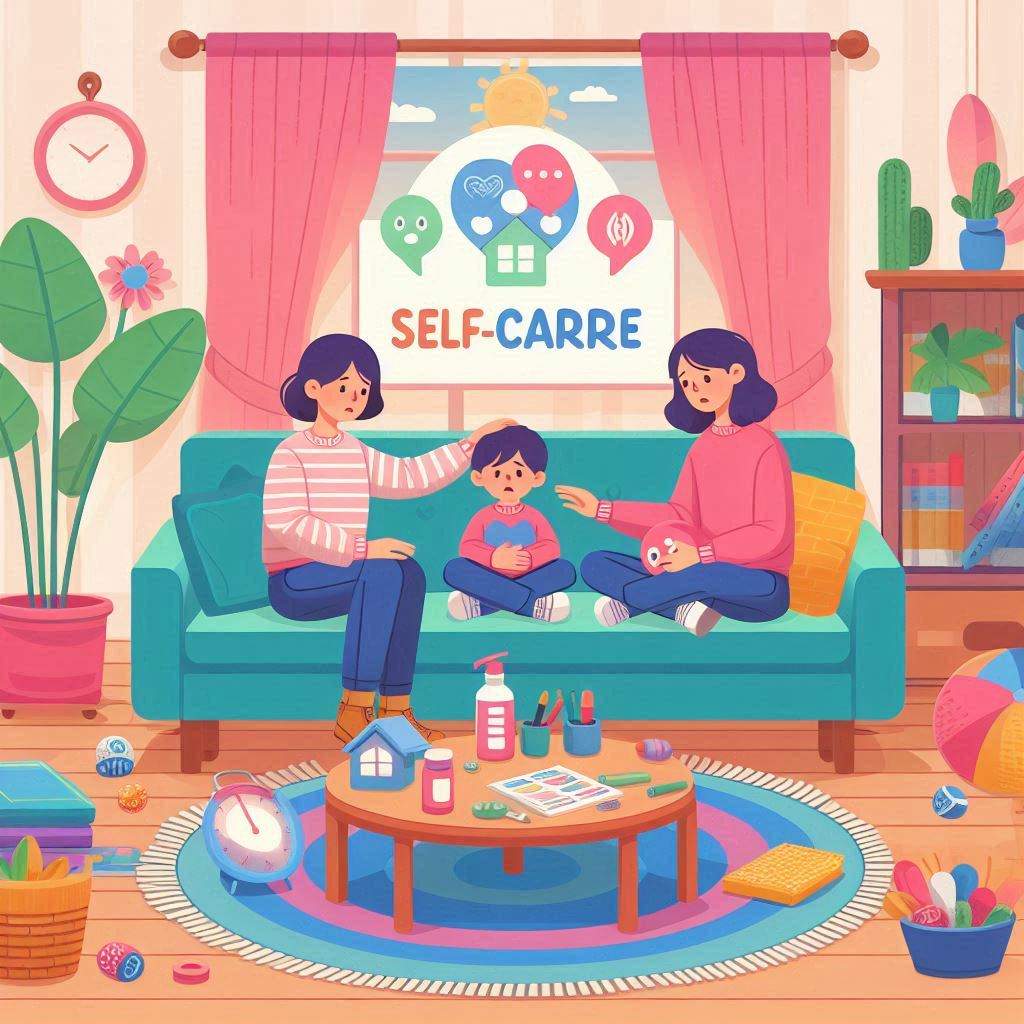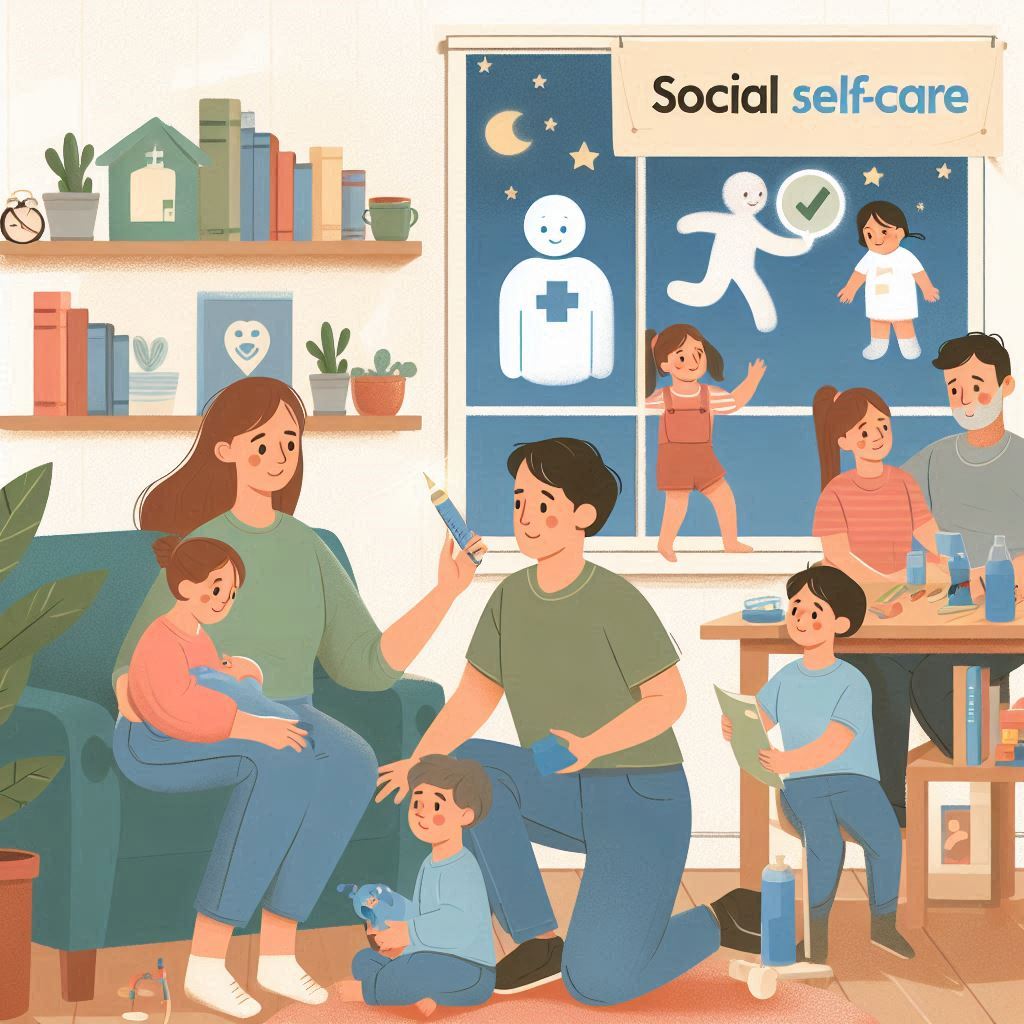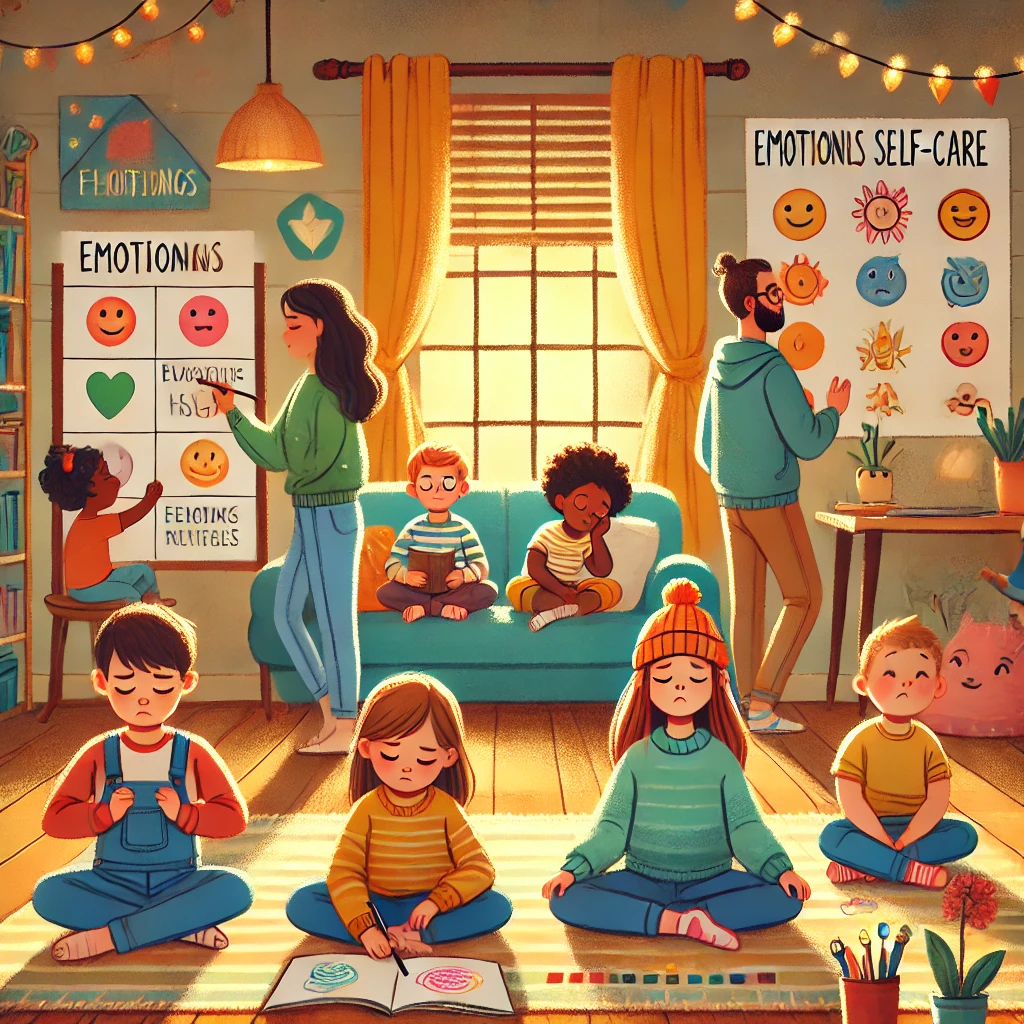Emotional Daily Self-care for Kids: Nurturing Mental Well-being and Resilience
Emotional self-care is vital for children’s mental health, helping them navigate feelings, build resilience, and maintain a positive self-image. Daily self-care for kids is essential as they encounter various challenges, from school pressures to social dynamics. Developing emotional self-care skills allows them to process their experiences, manage stress, and seek help when needed.
In this section, we will discuss the importance of emotional daily self-care for kids, identify signs that a child may need support, and provide practical strategies to promote emotional well-being.
Why Emotional Self-care is Important for Kids
Children experience a wide range of emotions, and teaching them how to manage these feelings is crucial for their development. Emotional self-care helps kids:
- Build Resilience: By learning to cope with stress and setbacks, children develop resilience, enabling them to face challenges more effectively.
- Enhance Self-awareness: Understanding their feelings helps kids recognize emotional triggers and patterns, fostering better decision-making and problem-solving skills.
- Improve Relationships: Children with good emotional self-care can communicate their feelings, empathize with others, and resolve conflicts in healthier ways.
Signs a Child May Need More Emotional Self-care
Recognizing when a child is struggling with their emotions is essential. Look for signs that may indicate your child could benefit from additional emotional support:
- Frequent Mood Swings: If your child experiences significant fluctuations in mood or displays extreme emotional reactions, they may need guidance in managing their feelings.
- Withdrawal from Activities: A sudden disinterest in favorite activities or social interactions can signal emotional distress.
- Difficulty Expressing Feelings: If your child struggles to articulate their emotions or often resorts to tantrums or outbursts, they may need help developing emotional vocabulary and coping strategies.
- Changes in Sleep or Appetite: Emotional struggles can affect a child’s sleep patterns or appetite. Look for signs of insomnia, nightmares, or changes in eating habits.
Practical Strategies for Encouraging Emotional Self-care in Kids
Supporting your child’s emotional self-care involves teaching them skills and providing a safe space for emotional expression. Here are some practical strategies:
1. Teach Emotional Vocabulary
Help your child learn to identify and express their feelings by teaching them emotional vocabulary. When children can articulate their emotions, they’re better equipped to manage them.
- Feelings Charts: Use feelings charts with faces representing various emotions. Encourage your child to point out how they feel throughout the day.
- Storytelling: Read books that explore emotions, discussing the characters’ feelings and how they navigate them. Ask questions like, “How do you think that character felt in that situation?”
Fact: A 2019 study published in the Journal of Child Psychology and Psychiatry found that children with strong emotional vocabulary were better at managing their emotions and had improved social skills.
2. Promote Mindfulness and Relaxation Techniques
Mindfulness practices can help children learn to manage stress and anxiety. These techniques teach kids to focus on the present moment and acknowledge their feelings without judgment.
- Breathing Exercises: Introduce simple breathing exercises, such as deep belly breathing. Encourage your child to inhale deeply for a count of four, hold for four, and exhale for four.
- Mindfulness Activities: Engage your child in mindfulness activities, like nature walks where they focus on their surroundings or guided imagery exercises that encourage them to visualize calming places.
Read More: Self-care for Kids: A Complete Guide to Building Healthy Habits
3. Create an Emotionally Safe Environment
Establishing a supportive home environment is crucial for your child’s emotional self-care. Children should feel safe expressing their emotions and seeking help when needed.
- Open Communication: Encourage open dialogue about feelings. Let your child know that it’s okay to express sadness, frustration, or anxiety without fear of judgment.
- Validate Emotions: Acknowledge your child’s feelings, even if you don’t fully understand them. Phrases like “It’s okay to feel sad” or “I can see you’re frustrated” help children feel heard and supported.
4. Encourage Healthy Outlets for Emotions
Children need healthy outlets to express their feelings constructively. Encourage activities that allow them to release emotions creatively and physically.
- Art and Creativity: Provide opportunities for creative expression through art, music, or writing. Encourage your child to draw their feelings or write a story about a situation that made them upset.
- Physical Activity: Regular physical activity can help children process emotions. Activities like running, dancing, or even martial arts can provide an emotional release.
Creating an Emotional Self-care Routine for Kids
A structured routine can help reinforce emotional self-care practices. Here’s a sample routine to encourage emotional well-being in children:
| Time of Day | Activity | Purpose |
| Morning | Morning check-in (discuss feelings) | Helps start the day with emotional awareness. |
| Afternoon | Creative expression (art, writing, etc.) | Provides a healthy outlet for feelings. |
| Evening | Mindfulness or relaxation activity | Encourages relaxation and emotional processing. |
| Bedtime | Reflect on the day (gratitude practice) | Fosters a positive mindset and emotional closure. |
The Role of Parents in Supporting Emotional Self-care

As a parent, you play a crucial role in helping your child develop emotional self-care skills. Here are some ways you can support them:
- Model Healthy Emotional Expression: Show your child how you manage your own emotions. When they see you express feelings healthily, they learn that it’s okay to do the same.
- Encourage Independence: While it’s essential to support your child, also encourage them to find their own ways to cope with emotions. This fosters resilience and self-reliance.
- Be Available: Make time to connect with your child regularly. Even short check-ins can provide reassurance and encourage emotional openness.
Quote: “Emotional self-care is just as important as physical self-care. Teaching children how to manage their feelings equips them for lifelong emotional health and resilience,” states Dr. Laura Markham, child psychologist and author.
Read More: Self-care for Kids: A Complete Guide to Building Healthy Habits
Key Takeaway:
Emotional self-care is a vital component of children’s overall well-being. By teaching kids to express their emotions, practice mindfulness, and engage in healthy coping strategies, parents can help foster resilience and emotional intelligence, preparing them to face life’s challenges.
Social Daily Self-care for Kids: Building Healthy Relationships and Community Connections
Social self-care is essential for children as it helps them develop the skills needed to form healthy relationships, communicate effectively, and navigate social dynamics. Healthy social interactions are crucial for children’s emotional well-being, self-esteem, and overall development. In a world where social connections are increasingly important, teaching kids the value of social self-care is vital for fostering a supportive community around them.
In this section, we’ll explore the importance of social self-care, identify the signs that your child may need support in this area, and provide practical strategies to help them build healthy relationships.
H3: Why Social Self-care is Important for Kids
Children learn how to interact with others and develop social skills through their experiences and relationships. Social self-care is crucial for several reasons:
- Emotional Support: Healthy friendships provide emotional support and a sense of belonging, helping children navigate challenges and build resilience.
- Improved Communication Skills: Social interactions help children develop verbal and non-verbal communication skills, crucial for expressing their needs and understanding others.
- Conflict Resolution: Learning how to resolve conflicts constructively is a vital skill that helps children navigate relationships and builds emotional intelligence.
Signs a Child May Need More Social Self-care
Identifying when your child may need additional support in social self-care can help you provide the necessary guidance. Look for these signs:
- Social Withdrawal: If your child is isolating themselves from friends or family activities, it may indicate they’re struggling with social interactions.
- Difficulty Making Friends: If your child has trouble forming friendships or is frequently rejected by peers, they may need help developing social skills.
- Frequent Conflicts: Children who often find themselves in conflicts with peers may struggle with communication or emotional regulation.
- Low Self-esteem: Signs of low self-esteem or insecurity can manifest in social situations, affecting your child’s ability to connect with others.
Practical Strategies for Encouraging Social Self-care in Kids
Supporting your child’s social self-care involves teaching them important social skills and providing opportunities for positive interactions. Here are some strategies:
1. Foster Open Communication
Encouraging open communication helps children feel comfortable discussing their feelings and experiences. This lays the groundwork for healthy relationships.
- Regular Check-ins: Schedule regular times to check in with your child about their day. Ask open-ended questions like, “What was the best part of your day?” or “Did you have any conflicts with friends today?”
- Active Listening: When your child speaks about their feelings or experiences, practice active listening. Acknowledge their thoughts and emotions without judgment.
2. Encourage Team Activities
Participation in team sports, clubs, or group activities can help children develop teamwork, cooperation, and communication skills.
- Join a Sports Team: Encourage your child to join a local sports team or recreational group. This not only promotes physical activity but also teaches social skills through collaboration.
- Participate in Group Projects: Encourage your child to take part in school or community group projects. This fosters teamwork and helps them learn to navigate different personalities.
Fact: A study published in the International Journal of Child-Computer Interaction found that children involved in team-based activities demonstrated higher levels of social competence and cooperation skills.
3. Teach Conflict Resolution Skills
Helping children learn how to resolve conflicts constructively prepares them for social challenges.
- Role-Playing: Use role-playing scenarios to practice resolving conflicts. This can help children learn how to express their feelings, listen to others, and find common ground.
- Discuss Empathy: Teach your child to consider others’ perspectives. Discuss situations where empathy can help diffuse conflicts, reinforcing the importance of understanding feelings.
4. Create Opportunities for Social Interaction
Providing opportunities for social interactions helps children practice their social skills in real-life settings.
- Playdates: Organize regular playdates with peers. This provides a relaxed environment for children to strengthen their friendships.
- Community Events: Encourage participation in community events, such as fairs, festivals, or volunteer opportunities. These settings promote socialization and help children connect with others outside their usual circle.
Creating a Social Self-care Routine for Kids
A structured routine can help reinforce social self-care practices. Here’s a sample routine to encourage social well-being in children:
| Time of Day | Activity | Purpose |
| Afternoon | Playdate or group activity | Encourages social interaction and relationship building. |
| Evening | Family game night or activity | Strengthens family bonds and communication skills. |
| Weekend | Participate in a team sport or club | Promotes teamwork and helps develop social skills. |

The Role of Parents in Supporting Social Self-care
Parents play a critical role in helping children develop their social skills and foster healthy relationships. Here are ways to support your child in this area:
- Model Healthy Relationships: Demonstrate how to build and maintain relationships. Show your child what healthy communication looks like through your interactions with others.
- Encourage Empathy: Teach your child to be empathetic by discussing emotions and perspectives. This can help them connect with their peers and develop stronger relationships.
- Be Involved: Get involved in your child’s social life by meeting their friends and participating in community events. This helps you understand their social dynamics and offers opportunities for guidance.
Quote: “Social self-care is essential for children. Teaching them how to connect with others positively equips them with skills they’ll use for a lifetime,” says Dr. Deborah Gilboa, a family physician and parenting expert.
Key Takeaway:
Social self-care is vital for children’s emotional development and well-being. By fostering open communication, encouraging teamwork, teaching conflict resolution, and creating opportunities for social interactions, parents can help their children build healthy relationships that contribute to a fulfilling life.
Physical Daily Self-care for Kids: Promoting Health and Wellness
Physical self-care is a fundamental aspect of the overall well-being of children. It encompasses healthy habits that contribute to physical health, such as proper nutrition, regular exercise, and sufficient sleep. Teaching children the importance of physical self-care not only promotes their current health but also lays the foundation for a lifetime of healthy habits.
In this section, we will discuss the significance of physical self-care, identify signs that a child may need more support in this area, and provide practical strategies to help them maintain a healthy lifestyle.
Why Physical Self-care is Important for Kids
Physical self-care is crucial for children for several reasons:
- Healthy Growth and Development: Proper nutrition and regular exercise are essential for healthy growth and development in children. They contribute to strong bones, muscles, and cognitive function.
- Improved Mood and Energy Levels: Physical activity releases endorphins, which can boost mood and energy levels. This can lead to improved focus and performance in school and other activities.
- Better Sleep Quality: Regular physical activity and a balanced diet contribute to better sleep quality, which is essential for a child’s overall well-being.
Signs a Child May Need More Physical Self-care
Recognizing when your child may need additional support in physical self-care can help you intervene early. Look for these signs:
- Poor Eating Habits: If your child frequently skips meals, prefers junk food, or shows little interest in healthy foods, they may need guidance in developing healthy eating habits.
- Lack of Physical Activity: A sedentary lifestyle, characterized by excessive screen time and little exercise, can signal a need for increased physical activity.
- Frequent Fatigue: If your child often complains of tiredness or lacks energy, it may indicate that their physical self-care practices need improvement.
- Sleep Issues: Difficulty falling asleep or staying asleep can be a sign of poor physical self-care.
Practical Strategies for Encouraging Physical Daily Self-care for Kids
Supporting your child’s physical self-care involves promoting healthy habits and providing opportunities for physical activity. Here are some strategies:
1. Promote Balanced Nutrition
Teaching children about balanced nutrition helps them develop healthy eating habits that last a lifetime.
- Involve Kids in Meal Planning: Include your child in meal planning and grocery shopping. Discuss the importance of fruits, vegetables, whole grains, and proteins in a balanced diet.
- Healthy Cooking Together: Prepare healthy meals together as a family. Cooking can be a fun and educational experience that encourages kids to try new foods.
Fact: Research from the American Journal of Clinical Nutrition shows that involving children in meal preparation increases their likelihood of making healthier food choices.
2. Encourage Regular Physical Activity
Regular exercise is vital for maintaining physical health and developing motor skills.
- Find Activities They Enjoy: Encourage your child to participate in physical activities they enjoy, such as swimming, dancing, biking, or playing sports. This increases the likelihood that they’ll stick with it.
- Set a Family Activity Day: Designate a day each week for family physical activities, like hiking, playing sports, or simply going for a walk. This fosters bonding while promoting fitness.
3. Establish a Sleep Routine
A consistent sleep routine is essential for physical self-care.
- Create a Relaxing Bedtime Routine: Establish a calming pre-sleep routine, including activities like reading or quiet time. This helps signal to your child that it’s time to wind down.
- Limit Screen Time Before Bed: Encourage limiting screen time at least one hour before bedtime, as screens can interfere with sleep quality.
4. Foster Outdoor Play
Encouraging outdoor play helps children engage in physical activity and connect with nature.
- Outdoor Playdates: Organize outdoor playdates with friends. This allows children to engage in active play while socializing.
- Limit Screen Time: Set limits on screen time to encourage outdoor play and exploration. Encourage children to engage with nature by visiting parks, nature trails, or gardens.

Creating a Physical Self-care Routine for Kids
A structured routine can help reinforce physical self-care practices. Here’s a sample routine to encourage physical well-being in children:
| Time of Day | Activity | Purpose |
| Morning | Healthy breakfast together | Provides essential nutrients for energy and growth. |
| Afternoon | Outdoor play or sports practice | Encourages physical activity and social interaction. |
| Evening | Family dinner with healthy options | Reinforces healthy eating habits and family bonding. |
| Bedtime | Wind down with a bedtime routine | Promotes relaxation and ensures quality sleep. |
The Role of Parents in Supporting Physical Self-care
Parents play a vital role in helping children develop and maintain healthy physical self-care habits. Here are some ways to support your child in this area:
- Be a Role Model: Model healthy eating and physical activity habits. Children are more likely to adopt behaviors they see in their parents.
- Encourage Exploration: Support your child’s interest in exploring various physical activities. This can help them find what they enjoy most.
- Make Health Fun: Incorporate fun elements into physical activities. Use games, challenges, or family competitions to keep kids engaged and motivated.
Quote: “Physical self-care is the foundation of a healthy life. Teaching children to value their physical health lays the groundwork for lifelong well-being,” states Dr. Jillian Roberts, child psychologist and author.
Key Takeaway:
Physical self-care is essential for children’s growth, development, and overall well-being. By promoting balanced nutrition, encouraging regular physical activity, establishing a sleep routine, and fostering outdoor play, parents can help their children develop lifelong healthy habits.
Daily Spiritual Self-care for Kids: Fostering Inner Peace and Values
Spiritual Daily self-care for kids encompasses practices that help them connect with their inner selves, develop a sense of purpose, and cultivate values such as empathy, kindness, and gratitude. While spirituality may look different for each child, fostering a sense of spirituality can contribute to their overall well-being, helping them navigate challenges with resilience and a positive mindset.
In this section, we will explore the significance of spiritual self-care for children, identify signs that they may need more support in this area, and provide practical strategies to nurture their spiritual growth.
Why Spiritual Self-care is Important for Kids
Spiritual self-care is vital for several reasons:
- Sense of Belonging: Engaging in spiritual practices can foster a sense of belonging and community, which is crucial for children’s emotional development.
- Inner Peace and Resilience: Spiritual practices can help children cultivate inner peace, which is essential for coping with stress and overcoming challenges.
- Development of Values: Spiritual self-care helps children understand their values, guiding them in making decisions and building healthy relationships with others.
Signs a Child May Need More Spiritual Self-care
Recognizing when your child may need additional support in spiritual self-care can help you provide guidance. Look for these signs:
- Feelings of Disconnection: If your child often expresses feelings of isolation or disconnection from others, they may benefit from spiritual practices that foster a sense of community.
- Lack of Purpose: If your child seems unmotivated or lacks a sense of direction, they may need help exploring their values and beliefs.
- Increased Stress or Anxiety: Children experiencing high levels of stress or anxiety may find solace in spiritual practices that promote mindfulness and inner peace.
Daily Practical Strategies for Encouraging Spiritual Self-care in Kids
Supporting your child’s spiritual self-care involves providing opportunities for exploration and reflection. Here are some strategies:
1. Encourage Mindfulness and Meditation
Mindfulness and meditation practices help children cultivate awareness of their thoughts and feelings, promoting inner peace.
- Mindfulness Exercises: Introduce simple mindfulness exercises, such as paying attention to their breath or observing nature. Encourage your child to take a few minutes each day to practice mindfulness.
- Guided Meditation: Use guided meditation apps or videos designed for kids. These resources can help children learn to relax and focus their minds.
2. Foster Gratitude Practices
Teaching children to cultivate gratitude can promote a positive outlook on life and help them appreciate the world around them.
- Gratitude Journals: Encourage your child to keep a gratitude journal, where they can write down things they are thankful for each day. This practice helps shift focus from negative to positive experiences.
- Family Gratitude Rituals: Incorporate gratitude rituals into family activities, such as sharing things you’re grateful for during meals or before bedtime.
Fact: Research from Psychological Science indicates that practicing gratitude can lead to increased happiness and reduced feelings of depression in children and adolescents.
3. Explore Nature and Connection to the Environment
Connecting with nature can foster a sense of wonder and spiritual awareness in children.
- Nature Walks: Take regular nature walks with your child. Encourage them to observe the beauty of nature and reflect on their feelings during these moments.
- Gardening: Involve your child in gardening activities. This can help them appreciate the cycle of life and develop a connection to the environment.
4. Discuss Values and Beliefs
Engaging in conversations about values and beliefs helps children explore their spirituality and understand their place in the world.
- Open Discussions: Create a safe space for open discussions about values, beliefs, and spirituality. Encourage your child to ask questions and express their thoughts.
- Introduce Inspirational Stories: Share stories from various cultures and religions that highlight values like kindness, empathy, and compassion. This broadens their understanding of different beliefs and encourages open-mindedness.
Creating a Spiritual Self-care Routine for Kids
A structured routine can help reinforce spiritual self-care practices. Here’s a sample routine to encourage spiritual well-being in children:
| Time of Day | Activity | Purpose |
| Morning | Morning mindfulness or meditation | Sets a positive tone for the day and promotes inner peace. |
| Afternoon | Nature exploration or gratitude activity | Fosters a connection to nature and gratitude. |
| Evening | Reflective journaling or family discussion | Encourages reflection on values and experiences. |
| Bedtime | Read spiritual or inspirational stories | Instills values and fosters a sense of wonder. |
The Role of Parents in Supporting Spiritual Self-care
Parents play a crucial role in nurturing their child’s spiritual self-care. Here are ways to support your child in this area:
- Model Spiritual Practices: Share your own spiritual practices or beliefs with your child. Your openness can encourage them to explore their own spirituality.
- Encourage Exploration: Allow your child to explore different spiritual beliefs and practices. This can help them find what resonates with them personally.
- Create a Supportive Environment: Foster an environment that encourages questions and exploration of values and beliefs. Ensure your child feels comfortable expressing their thoughts and feelings about spirituality.
Quote: “Spiritual self-care is about nurturing the soul. Teaching children to explore their spirituality can provide them with the tools to navigate life’s challenges with grace and resilience,” says Dr. Elizabeth Lesser, co-founder of Omega Institute.
Key Takeaway:
Spiritual self-care is essential for children’s overall well-being. By encouraging mindfulness, fostering gratitude, connecting with nature, and discussing values and beliefs, parents can help their children develop a strong sense of spirituality that supports their emotional and social development.
Daily Emotional Self-care for Kids: Nurturing Feelings and Resilience
Emotional self-care is crucial for children’s mental well-being, helping them understand, express, and manage their feelings effectively. Developing emotional self-care skills allows children to navigate the ups and downs of life with resilience and confidence. By fostering emotional intelligence, we empower kids to face challenges, build healthy relationships, and cultivate a positive self-image.
In this section, we will explore the importance of emotional self-care, identify signs that a child may need support, and provide practical strategies to help nurture their emotional well-being.
Why Emotional Self-care is Important for Kids
Emotional self-care is vital for several reasons:
- Enhanced Emotional Intelligence: Developing emotional self-care skills helps children recognize and understand their emotions, leading to better emotional intelligence.
- Improved Coping Skills: Children who practice emotional self-care are better equipped to cope with stress, anxiety, and other challenges, fostering resilience.
- Stronger Relationships: Emotional self-care promotes empathy and communication, enabling children to build and maintain healthy relationships with peers and adults.
Signs a Child May Need More Emotional Self-care
Identifying when your child may need additional support in emotional self-care can help you intervene early. Look for these signs:
- Mood Swings: Frequent changes in mood or emotional outbursts may indicate that your child is struggling to manage their feelings.
- Withdrawal: If your child is becoming increasingly withdrawn or isolating themselves from friends and family, they may need support in expressing their emotions.
- Changes in Behavior: Significant changes in behavior, such as increased irritability, sadness, or anxiety, can signal that your child is experiencing emotional distress.
- Difficulty Expressing Feelings: If your child struggles to articulate their feelings or frequently says they “don’t know” how they feel, they may need help developing emotional vocabulary.
Strategies for Encouraging Daily Emotional Self-care in Kids
Supporting your child’s emotional self-care involves providing them with tools to understand and express their feelings. Here are some strategies:
1. Teach Emotional Vocabulary
Helping children develop a rich emotional vocabulary allows them to articulate their feelings more effectively.
- Emotion Charts: Use emotion charts or cards to help your child identify and express their feelings. Discuss various emotions and what they mean, using examples from everyday life.
- Storytelling: Share stories or books that highlight different emotions. Discuss the characters’ feelings and responses to various situations, helping your child relate.
2. Encourage Healthy Expression of Feelings
Teach children healthy ways to express and cope with their emotions.
- Creative Outlets: Encourage your child to express their feelings through art, music, or writing. These creative outlets can help them constructively process emotions.
- Physical Activity: Engage your child in physical activities like sports, dance, or yoga. Exercise can be a healthy outlet for managing emotions and reducing stress.
3. Foster Open Communication
Creating an environment where children feel comfortable sharing their feelings is essential for emotional self-care.
- Active Listening: Practice active listening when your child speaks about their feelings. Validate their emotions and avoid minimizing their experiences.
- Regular Check-ins: Schedule regular times to check in with your child about their feelings. Use open-ended questions to encourage them to express themselves, such as “How did that make you feel?” or “What was the best part of your day?”
4. Teach Coping Strategies
Providing children with coping strategies helps them manage stress and navigate difficult emotions.
- Breathing Exercises: Teach your child simple breathing exercises to help them calm down when they feel overwhelmed. For example, the “4-7-8” technique involves inhaling for four seconds, holding for seven seconds, and exhaling for eight seconds.
- Mindfulness Practices: Introduce mindfulness techniques, such as focusing on their breath or engaging in sensory activities. These practices can help children stay grounded in the present moment.
Creating an Emotional Self-care Routine for Kids
A structured routine can help reinforce emotional self-care practices. Here’s a sample routine to encourage emotional well-being in children:
| Time of Day | Activity | Purpose |
| Morning | Morning affirmations or gratitude practice | Sets a positive tone for the day and promotes self-awareness. |
| Afternoon | Creative expression (art or music) | Encourages healthy emotional expression. |
| Evening | Family check-in about feelings | Fosters open communication and emotional support. |
| Bedtime | Relaxation techniques (deep breathing) | Promotes relaxation and prepares for restful sleep. |
The Role of Parents in Supporting Emotional Self-care
Parents play a vital role in nurturing their child’s emotional self-care. Here are ways to support your child in this area:
- Model Healthy Emotional Expression: Demonstrate how to express feelings in a healthy way. Share your own experiences and how you cope with emotions, reinforcing that it’s okay to feel and express various emotions.
- Encourage Problem-Solving: Teach your child to approach emotional challenges as problems to be solved. Help them brainstorm solutions when they face difficulties, promoting resilience.
- Create a Safe Space: Foster an environment where your child feels safe to share their feelings without judgment. Encourage open discussions about emotions and validate their experiences.
Quote: “Emotional self-care is not just about managing feelings; it’s about cultivating a deeper understanding of oneself. By teaching children to embrace their emotions, we empower them to navigate life with resilience and empathy,” says Dr. Laura Markham, clinical psychologist and author.
Key Takeaway:
Emotional self-care is essential for children’s mental health and overall well-being. By teaching emotional vocabulary, encouraging healthy expression of feelings, fostering open communication, and providing coping strategies, parents can help their children develop the emotional intelligence and resilience needed to thrive in life.
Social Daily Self-care for Kids: Building Healthy Relationships
Social self-care involves nurturing the relationships and connections that children have with family, friends, and their community. Healthy social interactions and relationships are vital for a child’s emotional and mental well-being. By fostering strong connections and teaching social skills, we empower children to build supportive networks that enhance their quality of life.
In this section, we will explore the significance of social self-care, identify signs that a child may need more support in this area, and provide practical strategies to help children nurture their social well-being.
Why Social Self-care is Important for Kids
Social self-care is essential for several reasons:
- Emotional Support: Healthy social connections provide emotional support, helping children navigate challenges and cope with stress.
- Enhanced Communication Skills: Engaging with peers and adults helps children develop vital communication skills, improving their ability to express themselves and interact with others.
- Sense of Belonging: Strong social connections foster a sense of belonging, which is crucial for children’s self-esteem and overall well-being.
Signs a Child May Need More Social Self-care
Recognizing when your child may need additional support in social self-care can help you intervene early. Look for these signs:
- Isolation: If your child prefers to spend time alone and avoids social interactions, they may need support in developing social skills and connections.
- Difficulty Making Friends: Struggling to make or maintain friendships can signal that your child needs guidance in building social relationships.
- Frequent Conflict with Peers: If your child experiences frequent conflicts with friends or peers, they may benefit from learning conflict resolution and communication skills.
- Low Self-esteem: Signs of low self-esteem, such as negative self-talk or reluctance to participate in group activities, can indicate a need for social self-care.
Practical Strategies for Encouraging Daily Social Self-care in Kids
Supporting your child’s social self-care involves providing opportunities for social interactions and teaching essential social skills. Here are some strategies:
1. Encourage Play and Social Interaction
Engaging in play and social activities helps children develop social skills and build friendships.
- Organize Playdates: Arrange playdates with peers to provide opportunities for social interaction. This can help your child practice social skills in a comfortable setting.
- Group Activities: Enroll your child in group activities or team sports. These environments encourage teamwork and communication, fostering connections with others.

2. Teach Social Skills
Helping children develop social skills is essential for building healthy relationships.
- Role-Playing: Use role-playing exercises to teach your child how to navigate social situations, such as introducing themselves, asking for help, or resolving conflicts.
- Social Stories: Share social stories that illustrate various social situations and appropriate responses. Discuss these scenarios and encourage your child to think about how they would react.
3. Foster Empathy and Kindness
Teaching children the importance of empathy and kindness can enhance their social interactions.
- Model Kindness: Demonstrate acts of kindness in your daily life. Encourage your child to observe and participate in these acts, reinforcing the importance of helping others.
- Discuss Feelings: Engage in discussions about feelings and emotions, both their own and those of others. Encourage your child to consider how their actions affect others and to practice empathy in their interactions.
4. Create Opportunities for Family Bonding
Strong family connections are essential for children’s social self-care.
- Family Activities: Plan regular family activities, such as game nights, outings, or shared hobbies. This strengthens family bonds and provides a supportive social network.
- Open Communication: Foster an environment of open communication within the family. Encourage your child to share their thoughts and feelings, reinforcing the importance of connection and support.
Creating a Social Self-care Routine for Kids
A structured routine can help reinforce social self-care practices. Here’s a sample routine to encourage social well-being in children:
| Time of Day | Activity | Purpose |
| Morning | Greeting family members | Encourages positive social interactions and connection. |
| Afternoon | Playdate or group activity | Provides opportunities for socializing and practicing skills. |
| Evening | Family dinner with open conversation | Fosters communication and strengthens family bonds. |
| Weekend | Community or group event | Encourages engagement with the community and building new friendships. |
The Role of Parents in Supporting Social Self-care
Parents play a crucial role in nurturing their child’s social self-care. Here are ways to support your child in this area:
- Encourage Exploration: Support your child in exploring different social settings, such as clubs, sports, or community events. This helps them develop confidence in social situations.
- Monitor Friendships: Keep an eye on your child’s friendships and interactions. Offer guidance and support as needed, helping them navigate challenges and conflicts.
- Celebrate Social Achievements: Acknowledge and celebrate your child’s social achievements, such as making a new friend or successfully resolving a conflict. This reinforces their efforts and encourages further growth.
Quote: “Social self-care is about nurturing connections that enrich our lives. Teaching children the importance of healthy relationships equips them with the tools to thrive emotionally and socially,” says Dr. Daniel Siegel, psychiatrist and author.
Key Takeaway:
Social self-care is essential for children’s emotional health and well-being. By encouraging play and social interaction, teaching social skills, fostering empathy, and creating opportunities for family bonding, parents can help their children build strong relationships and a supportive social network.
Daily Physical Self-care for Kids: Nurturing the Body and Mind
Physical self-care is essential for children’s overall health and well-being, encompassing activities that promote physical fitness, nutrition, and adequate rest. By instilling healthy habits early on, we empower children to take charge of their physical health, setting the foundation for a lifetime of wellness.
In this section, we will explore the importance of physical self-care, identify signs that a child may need more support in this area, and provide practical strategies to help children nurture their physical well-being.
Why Physical Self-care is Important for Kids
Physical self-care is crucial for several reasons:
- Healthy Growth and Development: Proper nutrition and physical activity are essential for children’s growth, helping them develop strong bones, muscles, and cognitive functions.
- Enhanced Mood and Energy Levels: Regular physical activity releases endorphins, improving mood and increasing energy levels, which can positively affect children’s emotional well-being.
- Prevention of Health Issues: Encouraging healthy habits early can help prevent obesity, diabetes, and other health-related issues later in life.
Signs a Child May Need More Physical Self-care
Identifying when your child may need additional support in physical self-care can help you intervene early. Look for these signs:
- Low Energy Levels: If your child frequently complains of tiredness or seems lethargic, they may not be getting enough physical activity or proper nutrition.
- Poor Eating Habits: Signs of unhealthy eating habits, such as a diet high in processed foods and low in fruits and vegetables, can indicate a need for improved nutrition.
- Physical Complaints: Frequent complaints about aches and pains, especially after physical activity, may suggest that your child needs to build physical strength and endurance.
- Difficulty Sleeping: If your child has trouble falling or staying asleep, it may be linked to poor physical health or lack of physical activity during the day.
Practical Strategies for Encouraging Physical Self-care in Kids
Supporting your child’s physical self-care involves promoting healthy habits and providing opportunities for physical activity. Here are some strategies:
1. Promote Regular Physical Activity
Encouraging daily physical activity is crucial for children’s physical self-care.
- Active Play: Encourage your child to engage in active play, such as riding bikes, playing tag, or jumping rope. Aim for at least 60 minutes of active play each day.
- Team Sports or Classes: Enroll your child in team sports or physical activity classes (like dance or martial arts). These activities foster teamwork, discipline, and physical fitness.
2. Encourage Healthy Eating Habits
Teaching children about nutrition is essential for their physical health.
- Balanced Meals: Provide balanced meals that include a variety of fruits, vegetables, whole grains, lean proteins, and healthy fats. Involve your child in meal planning and preparation to make it more engaging.
- Healthy Snacks: Offer healthy snack options, such as fruits, yogurt, or nuts, instead of processed snacks. Make healthy snacking fun by preparing colorful fruit salads or smoothies together.
3. Establish a Consistent Sleep Routine
A consistent sleep routine is essential for children’s physical health.
- Set Bedtime Routines: Create a calming bedtime routine that includes activities such as reading, journaling, or quiet time to help your child wind down before sleep.
- Limit Screen Time: Establish screen time limits, especially before bedtime, to promote better sleep hygiene. Encourage activities that relax the mind, like reading or drawing.
4. Educate About Hygiene Practices
Teaching children about personal hygiene is an important aspect of physical self-care.
- Handwashing: Encourage regular handwashing, especially before meals and after using the bathroom, to promote good hygiene and prevent illness.
- Dental Care: Teach your child the importance of dental hygiene, including regular brushing and flossing. Make it fun by using colorful toothbrushes or songs while brushing.
Creating a Physical Self-care Routine for Kids
A structured routine can help reinforce physical self-care practices. Here’s a sample routine to encourage physical well-being in children:
| Time of Day | Activity | Purpose |
| Morning | Healthy breakfast with family | Provides energy for the day and encourages healthy eating habits. |
| Afternoon | Outdoor play or sports activity | Promotes physical fitness and social interaction. |
| Evening | Family dinner with balanced nutrition | Reinforces healthy eating habits and family bonding. |
| Bedtime | Consistent bedtime routine | Ensures adequate rest and supports physical health. |
The Role of Parents in Supporting Physical Self-care
Parents play a crucial role in nurturing their child’s physical self-care. Here are ways to support your child in this area:
- Be a Role Model: Demonstrate healthy behaviors, such as regular exercise and balanced eating. Your actions can inspire your child to adopt similar habits.
- Make it Fun: Find creative ways to make physical activity enjoyable. Plan family outings that involve physical activity, like hiking, swimming, or dancing.
- Provide Resources: Ensure that your child has access to resources, such as sports equipment, healthy foods, and safe spaces for physical activity.
Quote: “Physical self-care is about nurturing the body and mind. By encouraging children to engage in healthy habits, we equip them with the tools for a lifetime of wellness,” says Dr. Michelle Dossett, physician and wellness advocate.
Key Takeaway:
Physical self-care is essential for children’s health and overall well-being. By promoting regular physical activity, encouraging healthy eating habits, establishing consistent sleep routines, and educating about hygiene practices, parents can help their children develop a strong foundation for lifelong wellness.
Daily Spiritual Self-care for Kids: Cultivating Inner Peace and Values
Daily Spiritual self-care for kids involves nurturing their sense of purpose, values, and connection to something greater than themselves. It can encompass a variety of practices, including mindfulness, reflection, and the exploration of beliefs. Fostering spiritual self-care helps children develop resilience, a sense of community, and a greater understanding of themselves and the world around them.
In this section, we will explore the importance of spiritual self-care, identify signs that a child may need more support in this area, and provide practical strategies to help children nurture their spiritual well-being.
Why Spiritual Self-care is Important for Kids
Spiritual self-care is important for several reasons:
- Sense of Purpose: Engaging in spiritual practices helps children discover their values and beliefs, fostering a sense of purpose in their lives.
- Resilience: Spiritual self-care provides tools for coping with stress and adversity, helping children build resilience and a positive outlook on life.
- Connection to Others: Exploring spirituality can foster a sense of connection to others, promoting empathy, kindness, and a sense of belonging within communities.
Signs a Child May Need More Spiritual Self-care
Recognizing when your child may need additional support in spiritual self-care can help you intervene early. Look for these signs:
- Feelings of Disconnection: If your child expresses feelings of loneliness or disconnection from peers or family, they may need support in nurturing their sense of belonging.
- Lack of Purpose: A child who struggles to find meaning or purpose in their activities may benefit from exploring spiritual self-care practices.
- Increased Anxiety or Stress: If your child experiences heightened anxiety or stress, they may need guidance in finding grounding techniques and coping strategies.
- Negative Self-talk: Frequent negative self-talk or feelings of worthlessness can signal a need for spiritual self-care to help foster a positive self-image.
Practical Strategies for Daily Encouraging Spiritual Self-care in Kids
Supporting your child’s spiritual self-care involves providing opportunities for exploration and reflection. Here are some strategies:
1. Encourage Mindfulness Practices
Mindfulness can help children develop a sense of awareness and presence, promoting spiritual well-being.
- Mindfulness Activities: Introduce mindfulness activities such as meditation, deep breathing exercises, or guided imagery. These practices help children connect with their inner selves and find calmness.
- Nature Walks: Encourage your child to spend time in nature, observing the beauty around them. Nature can provide a sense of peace and connection to the world.
2. Explore Values and Beliefs
Helping children explore their values and beliefs can foster a sense of purpose and understanding.
- Discussion of Values: Engage in conversations about values such as kindness, honesty, and respect. Discuss examples of these values in action and how they can apply them in their daily lives.
- Cultural and Spiritual Exploration: Introduce your child to various cultural and spiritual practices, such as visiting places of worship or participating in community events that celebrate different beliefs.
3. Create Rituals and Traditions
Rituals and traditions can help children feel connected to their family and community.
- Family Traditions: Establish family traditions that promote togetherness, such as weekly family dinners, volunteering, or celebrating cultural holidays. These traditions can strengthen family bonds and provide a sense of belonging.
- Personal Rituals: Encourage your child to create personal rituals that resonate with them, such as journaling, gratitude practices, or lighting a candle during quiet time.
4. Foster Gratitude Practices
Practicing gratitude helps children develop a positive mindset and appreciation for their lives.
- Gratitude Journals: Encourage your child to keep a gratitude journal where they can write down things they are thankful for each day. This practice helps shift focus from negative to positive experiences.
- Gratitude Discussions: Engage in regular family discussions about gratitude, sharing things you are grateful for and encouraging your child to do the same.
Creating a Spiritual Self-care Routine for Kids
A structured routine can help reinforce spiritual self-care practices. Here’s a sample routine to encourage spiritual well-being in children:
| Time of Day | Activity | Purpose |
| Morning | Morning mindfulness or meditation | Sets a positive tone for the day and promotes inner calm. |
| Afternoon | Nature exploration or outdoor play | Connects children to nature and fosters reflection. |
| Evening | Family gratitude sharing | Reinforces connection and appreciation within the family. |
| Weekend | Attend a cultural or spiritual event | Encourages exploration of beliefs and values in a community setting. |
The Role of Parents in Supporting Spiritual Self-care
Parents play a vital role in nurturing their child’s spiritual self-care. Here are ways to support your child in this area:
- Model Spiritual Practices: Share your own spiritual practices or beliefs with your child. This can inspire them to explore their own spiritual journey.
- Encourage Questions: Create an open environment where your child feels comfortable asking questions about spirituality, beliefs, and values. Engage in thoughtful discussions to help them find their own answers.
- Support Exploration: Encourage your child to explore various spiritual practices and beliefs. Provide resources, such as books or community events, to help them discover what resonates with them.
Quote: “Spiritual self-care is about nurturing the soul. It’s about finding connection, purpose, and peace within ourselves and with others. When we support our children in this journey, we empower them to lead fulfilled lives,” says Dr. Lisa Miller, psychologist and author.
Key Takeaway:
Spiritual self-care is essential for children’s emotional health and well-being. By encouraging mindfulness practices, exploring values and beliefs, creating rituals and traditions, and fostering gratitude practices, parents can help their children develop a strong sense of purpose and connection to themselves and the world around them.
Emotional Daily Self-care for Kids: Fostering Resilience and Self-awareness
Emotional self-care involves helping children understand and manage their feelings, develop resilience, and cultivate self-awareness. By teaching emotional self-care, parents equip their children with the skills to navigate life’s challenges, express their emotions healthily, and build strong coping mechanisms. This foundational aspect of self-care is essential for children’s overall well-being and helps them thrive in various situations.
In this section, we will explore the importance of emotional self-care, identify signs that a child may need more support in this area, and provide practical strategies to help children nurture their emotional well-being.
Why Emotional Self-care is Important for Kids
Emotional self-care is crucial for several reasons:
- Understanding Emotions: Emotional self-care helps children recognize, understand, and express their feelings, leading to better emotional regulation.
- Coping with Stress: Developing coping strategies empowers children to handle stress and adversity effectively, promoting resilience.
- Healthy Relationships: Children who practice emotional self-care are better equipped to build and maintain healthy relationships with peers and family members.
Signs a Child May Need More Emotional Self-care
Identifying when your child may need additional support in emotional self-care can help you intervene early. Look for these signs:
- Frequent Mood Swings: If your child experiences significant mood fluctuations, it may indicate a need for support in managing their emotions.
- Difficulty Expressing Feelings: Struggling to articulate feelings or frequently bottling up emotions can signal that your child needs help in understanding and expressing their emotions.
- Behavioral Changes: Noticeable changes in behavior, such as increased irritability, withdrawal from activities, or sudden outbursts, may indicate emotional distress.
- Low Self-esteem: Frequent negative self-talk or lack of confidence can be signs that your child needs guidance in building emotional resilience and self-acceptance.
Practical Strategies for Daily Encouraging Emotional Self-care in Kids
Supporting your child’s emotional self-care involves providing tools for emotional expression and coping. Here are some strategies:
1. Teach Emotional Awareness
Helping children develop emotional awareness is essential for their emotional self-care.
- Emotion Vocabulary: Encourage your child to expand their emotional vocabulary by teaching them words for different feelings. Use visual aids, such as emotion charts, to help them accurately identify and express their emotions.
- Feelings Check-ins: Incorporate regular feelings check-ins into your routine, where your child can share how they are feeling. This practice normalizes emotional expression and encourages open dialogue.
2. Encourage Healthy Emotional Expression
Teaching children how to express their emotions healthily is key to emotional self-care.
- Creative Outlets: Provide opportunities for creative expression, such as drawing, painting, or writing. These activities allow children to process their feelings in a constructive manner.
- Role-Playing: Use role-playing exercises to help your child practice expressing their feelings and navigating challenging situations. This can build their confidence in handling emotional interactions.
3. Foster Coping Strategies
Equipping children with coping strategies helps them manage stress and adversity.
- Breathing Techniques: Teach your child deep breathing exercises to help them calm down during stressful moments. Encourage them to use these techniques when they feel overwhelmed.
- Positive Self-talk: Encourage your child to practice positive self-talk, reinforcing their ability to cope with challenges. Help them create affirmations they can repeat during tough times.
4. Create a Safe Space for Emotions
Establishing a safe space for emotions allows children to feel comfortable expressing themselves.
- Non-judgmental Environment: Foster an environment where your child feels safe to express their feelings without judgment. Validate their emotions and reassure them that it’s okay to feel various emotions.
- Open Communication: Encourage open communication within the family. Make it clear that sharing feelings is encouraged and that you are there to listen and support them.
Creating an Emotional Self-care Routine for Kids
A structured routine can help reinforce emotional self-care practices. Here’s a sample routine to encourage emotional well-being in children:
| Time of Day | Activity | Purpose |
| Morning | Morning check-in about feelings | Sets a positive tone for the day and encourages emotional expression. |
| Afternoon | Creative time for drawing or writing | Provides a healthy outlet for emotions and self-expression. |
| Evening | Family discussion about the day’s feelings | Reinforces connection and encourages open dialogue about emotions. |
| Bedtime | Relaxation techniques, such as reading | Promotes relaxation and helps process the day’s emotions before sleep. |
The Role of Parents in Supporting Emotional Self-care
Parents play a vital role in nurturing their child’s emotional self-care. Here are ways to support your child in this area:
- Model Emotional Expression: Demonstrate healthy emotional expression by sharing your feelings and coping strategies. Your behavior can serve as a model for your child.
- Encourage Problem-solving: Help your child develop problem-solving skills when faced with emotional challenges. Encourage them to think through solutions and explore different perspectives.
- Provide Resources: Offer resources, such as books or games, that focus on emotional intelligence and coping strategies. These tools can enhance your child’s understanding of emotions and foster resilience.
Quote: “Emotional self-care is about teaching children to navigate their feelings and build resilience. When we equip them with these tools, we empower them to thrive in the face of life’s challenges,” says Dr. Susan David, psychologist and author.
Key Takeaway:
Emotional self-care is essential for children’s well-being and resilience. By teaching emotional awareness, encouraging healthy expression, fostering coping strategies, and creating a safe space for emotions, parents can help their children develop strong emotional health and navigate life’s ups and downs effectively.
Conclusion: Embracing Daily Self-care for Kids
Daily Self-care for kids is a multifaceted approach that encompasses physical, emotional, social, and spiritual well-being. By nurturing these areas, parents can empower their children to thrive, build resilience, and develop a strong foundation for lifelong health and happiness.
Final Thoughts
Encouraging daily self-care for kids is not just a one-time effort but an ongoing process that requires patience, understanding, and commitment. As children learn to take care of themselves holistically, they develop the skills necessary to navigate life’s challenges, fostering a sense of independence and confidence.
Call to Action: As a parent or caregiver, take time to explore these self-care practices with your child. Involve them in discussions, create routines, and model healthy behaviors to ensure that they grow into well-rounded individuals who value their well-being.











1 thought on “Daily Self-care for Kids: A Complete Guide to Building Healthy Habits”